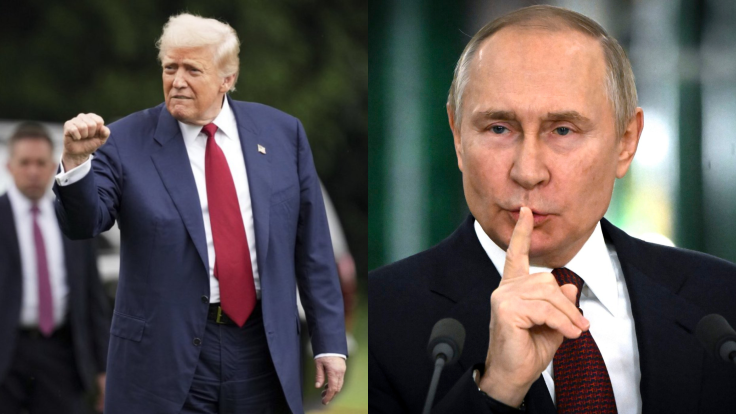Crimea Betrayal? Trump Tells Ukraine to Abandon Claim and Accept Russia's Control
Zelenskyy vows Ukraine will not concede Crimea despite Trump's remarks

US President Donald Trump has escalated tensions ahead of a high-stakes White House meeting by pressuring Ukrainian President Volodymyr Zelenskyy to concede on two of Russia's core demands.
Trump insisted that Kyiv must drop its NATO membership ambitions and relinquish its claim to Crimea if it wants peace with Moscow.
Posting on his social media platform, Trump declared there would be 'no getting back Crimea' and 'no going into NATO by Ukraine,' remarks that effectively aligned Washington with the Kremlin's long-standing position.
He suggested Zelenskyy could end the war 'almost immediately' if he agreed to the terms, but warned the conflict would continue if Kyiv refused.
Trump Aligns US Stance With Moscow
The timing of Trump's announcement is notable. His comments came just days after direct talks with Russian President Vladimir Putin and on the eve of a high-level summit in Washington. The gathering will bring together Zelenskyy, French President Emmanuel Macron, UK Prime Minister Keir Starmer, and German Chancellor Friedrich Merz.
Analysts warn that Trump's position mirrors Moscow's red lines, raising concerns that the US could be moving closer to endorsing Russia's territorial ambitions. As The Independent reported, Trump's demands risk fracturing Western unity at a time when solidarity is critical to resisting Russian advances.
Zelenskyy Rejects Concessions
Zelenskyy has made clear that Ukraine will not accept peace at the expense of its sovereignty. He has repeatedly stated that Crimea, annexed by Russia in 2014, remains Ukrainian territory and that NATO membership is vital for Ukraine's security.
Speaking ahead of the summit, Zelenskyy warned that past compromises with Russia only encouraged more aggression. He emphasized that a sustainable peace must be built on secure borders, international law, and Ukraine's right to choose its alliances.
European leaders are expected to stand firmly behind him. Macron and Starmer have both underscored that Ukraine's NATO aspirations are essential for regional stability, while Merz has cautioned that conceding territory to Moscow would set a dangerous precedent for Europe.
Why Crimea Remains A Flashpoint
Crimea remains one of the most contested battlegrounds of the conflict. Annexed by Russia in 2014, the peninsula is home to the Black Sea Fleet's base in Sevastopol, making it central to Moscow's influence in the region.
For Kyiv, regaining control of Crimea is not only about territorial integrity but also about curbing Russia's ability to project military power. In June 2025, Ukraine carried out a high-profile strike on the Crimean Bridge, a key supply route linking the peninsula to Russia, demonstrating its determination to challenge Moscow's hold.
Western Leaders Fear Division
European leaders reacted with alarm to Trump's statements, warning that his position could weaken Ukraine's negotiating hand. Macron, Starmer, and Merz have all signaled that they will oppose any deal that forces Kyiv to cede land.
Analysts argue that Trump's remarks risk emboldening Russia, sending a message that its territorial gains may eventually be recognized. Critics also fear this could undermine global norms by legitimizing aggression and redrawing borders through force.
A Summit That Could Redefine Alliances
The upcoming Washington summit is shaping into a critical test of Western resolve. With Zelenskyy, Macron, Starmer, and Merz expected to present a united front, Trump faces growing pressure to clarify whether his administration will continue to support Ukraine's sovereignty or pivot toward a more conciliatory stance with Moscow.
The outcome of these talks will influence not only the trajectory of the war but also the credibility of the Western alliance. As the conflict grinds on, Ukraine is seeking binding security guarantees from the US and NATO to deter future Russian aggression, while Trump's approach risks upending years of collective strategy.
The summit represents more than a diplomatic meeting. It is a crossroads moment for European security and the international order, where decisions taken in Washington could shape the balance of power for years to come.
© Copyright IBTimes 2025. All rights reserved.





















